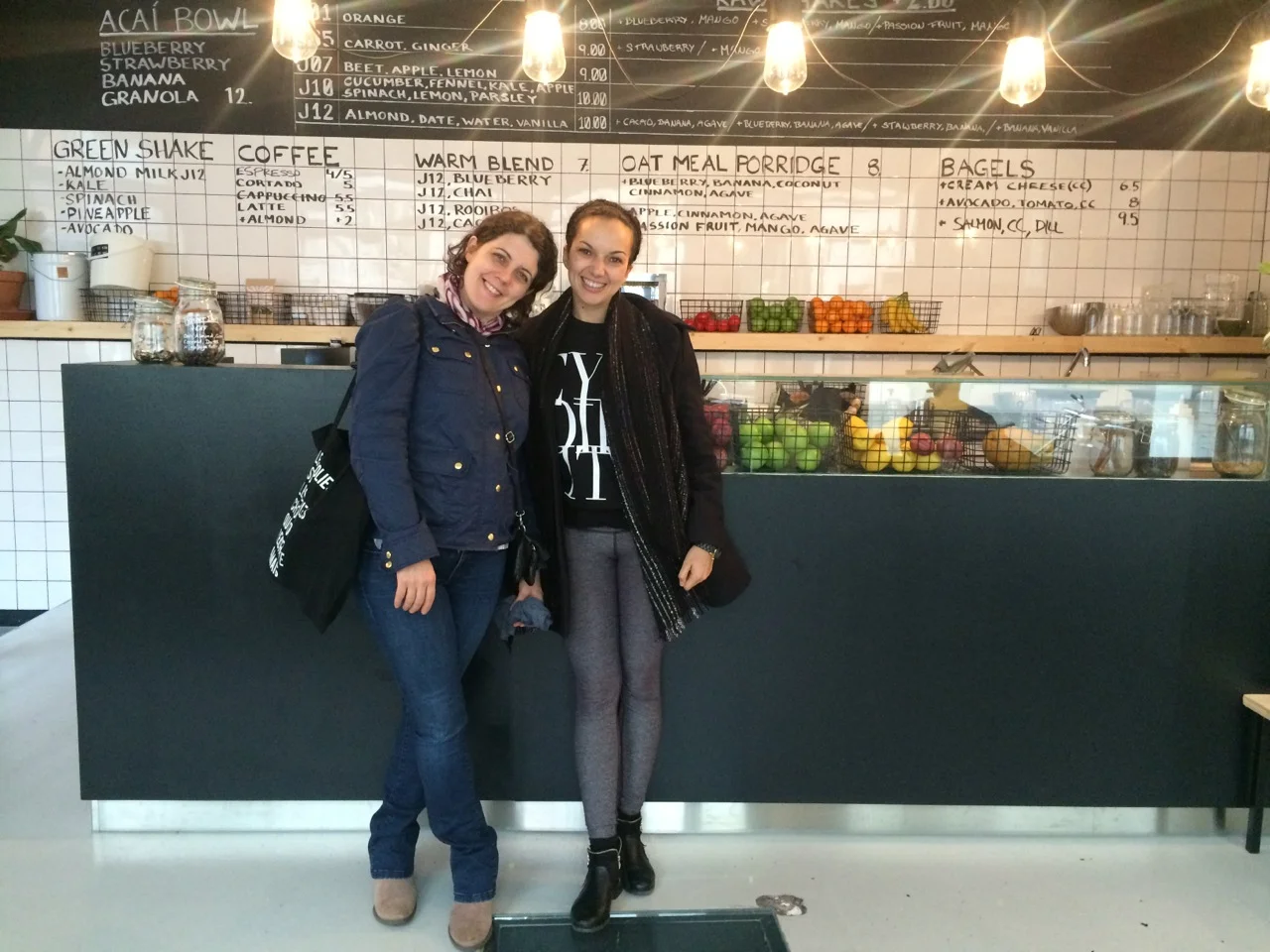Interview with Mary Dana Abbott Co-Creative Director Laughing Lotus NYC
Mary Dana ist eine Yoga Lehrerin aus New York, die im April dieses Jahres in der Schweiz und in Deutschland sozusagen auf Yoga-Tournée war und in verschiedenen Studios Yoga unterrichtete. In diesem Interview erzählt sie von ihren Inspirationsquellen, wie sie durch das Yoga Unterrichten mutiger wurde und wieso sie in ihren Stunden Witze reisst.
Deddou: Wie würdest du deinen Unterricht beschreiben?
Mary Dana: Ich unterrichte Alignment basiertes Vinyasa Yoga, das Spass macht und für alle zugänglich ist. Das mixe ich mit viel Witz und Charme und intelligentem Sequencing.
Deddou: Was bedeutet intelligentes Sequencing für dich?
Mary Dana: Es geht darum, Ähnlichkeiten zwischen den Posen zu finden und ein paar davon herauszupicken, die man ständig wiederholt. Obwohl man nicht immer die gleiche Übung macht, repetiere ich gerne und bringe diverse Variationen z.B. in den Armen hinein. So ergibt sich eine feine Balance zwischen Entspannung und mentaler Präsenz. Ich gebe den Studenten also sich wiederholende Asanas im Flow und zur gleichen Zeit schaue ich, dass ihr Geist stimuliert bleibt, indem ich die Posen leicht abändere. Des Weiteren füge ich ein paar Herausforderungen hinzu, damit sie wach und achtsam bleiben. Für mich heisst intelligentes Sequencing auch die richtige Balance zwischen Alignment und Flow zu finden. Keine der Übungen ist überflüssig, sondern alle haben einen Sinn und ihren Zweck zur Erarbeitung der Peak-Pose.
Deddou: Es ist nun das fünfte Mal, dass du in Europa unterrichtest. Dieses Mal gibst du Workshops in der Schweiz und in Deutschland. Was gefällt dir beim reisen und unterrichten?
Mary Dana: Es macht sehr viel Spass neue Kulturen zu entdecken, lokal zu essen, mit verschiedenen Leuten zu sprechen und ihre Weltsicht kennen zu lernen. Während dem Reisen gebe ich längere Stunden, kann neue Bewegungen entdecken und diese tiefgründig erklären. Wenn du reist, verirrst du dich manchmal und musst deinen Weg wieder finden, du befindest dich auf einem anderen Level der Aufmerksamkeit. Neue Umgebungen inspirieren mich. Eine Sprache nicht zu kennen, ist wie eine neue Pose - man muss herausfinden, wie sie funktioniert. Das ist auch ein Element des intelligenten Sequencings.
Deddou: Erkennst du einen Unterschied zwischen der Yoga Praxis hier in Europa und in New York?
Mary Dana: Ich sehe nur minime Unterschiede. Leute kommen mit einer anderen Mentalität in die regulären Stunden, die ich in New York unterrichte. Wenn ich in Europa bin, gebe ich Workshops und Teacher Trainings. Das wäre der einzige Unterschied. Es fällt mir leicht in neuen, unbekannten Umgebungen zu unterrichten. Ich versuche immer in den Raum reinzuhören und gehe bewusst ganz unbefangen und ohne Vorstellungen auf die Yogis zu. Ich denke, es ist wichtig, dass man flexibel bleibt und auch mal seinen Plan ändern kann. Das musste ich definitiv schon einige Male in meinem Leben tun.
Deddou: Wenn du unterrichtest, bist du sehr unterhaltsam. Alle lachen und haben Spass. Hatte das Unterrichten einen Einfluss auf deine Persönlichkeit, sei es während dem Unterrichten oder in deinem Alltag?
Mary Dana: Vor vielen Leuten zu unterrichten ist definitiv eine interessante Erfahrung. Unterrichten hat mir auch Mut in anderen Bereichen meines Lebens gegeben: Es hat mich selbstbewusster gemacht und mir gezeigt, wie ich in ungewohnten Situationen reagieren kann. In wenigen Worten würde ich sagen, dass es mir erlaubt hat, mich selbst freier auszudrücken. Ich versuche bewusst, die Leute aufzulockern und ab und zu einen Witz zu reissen, auch wenn man eine ernste Yoga-Pose übt. Ich denke, es ist wichtig, dass Lehrer Persönlichkeit zeigen und authentisch sind. Du musst dein Vertrauen in dich immer wieder weiterentwickeln und stärken. Aber natürlich ist es nicht immer eine Comedy Show. Du willst einen sicheren Ort schaffen, wo sich die Leute mitteilen, und physisch, philosophisch und spirituell wachsen können.
Deddou: Was rätst du neuen Lehrern, die gerade anfangen zu unterrichten?
Mary Dana: Bleibe am Ball und höre nie auf zu lernen! Und gib dir selbst eine Pause, wenn nicht alles so klappt wie du es dir gerne wünschst. Du musst die Leute im Raum unterrichten, manchmal eine gemischte Gruppe, manchmal Anfänger oder Fortgeschrittene - du kannst dich also nicht immer auf deinen Plan verlasen und alles von deinen Notizen ablesen. Plane, aber bleib nicht daran hängen. Du musst deiner Arbeit vertrauen und lernen, dich gut und entspannt zu fühlen während dem du unterrichtest. Es hört sich kitschig an, doch sei authentisch. Manche Lehrer sind nicht wirklich sich selbst, einige haben sogar eine gekünstelte Stimme, wenn sie zu unterrichten beginnen. Du musst deine eigene Stimme finden.
Deddou: Wo holst du deine Inspiration?
Mary Dana: Ich finde überall Inspiration. An einem Tag finde ich neue Inspiration in einer Fitness Klasse, an einem anderen Tag finde ich sie in einem Film, einem Buch, in der Natur oder im Kreise meiner Familie. Man kann immer Inspiration finden und wenn ich Schwierigkeiten damit habe, dann besuche ich eine Yogastunde von einem inspirierenden Lehrer oder plane eine Reise. Zudem: Wenn du draussen bist, starre nicht immer in dein Handy. Schaue dir stattdessen die Umgebung an und beobachte, wie sich Menschen bewegen. Ich praktiziere, um offen, neugierig und mutig zu sein.
Interview von Deddou Burkhard
Transkribiert von Sara Bagladi
*Mary Dana is a New York based senior yoga teacher who was touring studios in Switzerland and Germany earlier this year in April. In this interview she talks about her sources of inspiration, how being a yoga teacher made her more courageous and why she is cracking jokes in her classes.
Deddou: How would you describe your classes?
Mary Dana: My classes are an alignment based Vinyasa that is fun and accessible to everyone. I furthermore add intelligence, playfulness and smart sequencing.
Deddou: What is smart sequencing for you?
Mary Dana: It’s finding out how to thread together similarities between the poses and pick out a few things that you repeat over again and over again, even though you’re not doing the same thing. It’s a fine balance between being able to relax and yet being fully present. That’s why repetition is key. So I give the students some repetition during class and at the same time I keep their minds stimulated by changing up the poses and threading in more challenges to keep them in a state of paying attention. Smart sequencing for me is also about finding the right balance between alignment and flow. So none of the movements are extra, but all of them make sense and feed a purpose, whether that is a peak pose or a counter pose of the peak pose.
Deddou: It’s your fifth time teaching in Europe, this time you teach workshops in Switzerland and Germany. What do you like about travel teaching?
Mary Dana: It’s a lot of fun to see different cultures, eat different foods, talking to different people and getting their views on the world. When travelling I have longer courses and longer practices, where I get to explore new movements and explain them in depth. When you’re travelling you get lost and find your way around, you’re on another level of paying attention. Being in other surroundings, inspires me. Not being familiar with the language is like being unfamiliar with a pose and trying to figure it out. That’s also an element of sequencing.
Deddou: Do you notice a difference between the practice here in Europe and back in New York?
Mary Dana: A little bit, but not in huge ways. People come with a different mentality to regular classes, which I teach in New York. When I am in Europe I only teach workshops and trainings. That would be the only difference, though. I have an easy time teaching in unfamiliar places. I always make sure to listen to the room and I try to meet the people where they are at. I think it’s important to be able to change your plan. I definitely had to do that a few times in my life.
Deddou: When you are teaching, you are very entertaining. Everybody is laughing and having a good time. Has teaching had an affect on your personality off the mat and on the mat?
Mary Dana: Teaching in front of a lot of people is definitely an interesting practice. Teaching has definitely given me some bravery for other parts in my life: it made me more confident and confortable with unfamiliar circumstances. Learning how to be in front of a room filled with people and having to deal with a lot is an interesting practice and has affected me in many ways. In a few words I would say it allowed me to express myself more freely. My method is to go for the jokes and make it less serious, even though you’re practicing a serious pose. I learned how to crack a joke through teaching yoga. I think it’s important that teachers show personality and are more authentic. You have to develop a sense of trust. But of course it’s not always a comedy show. You want to create a safe place for people to share, listen and grow physically, philosophically and spiritually.
Deddou: What do you advice new teachers when they freshly start teaching?
Mary Dana: Be a constant learner! And give yourself a break, if things don’t turn out that well. You have to teach the room you’re in, so you can’t be fixed on your plan and read everything off a piece of paper. Plan, but don’t get stuck with it. You have to trust your work enough and get comfortable and relaxed while teaching. It sounds cheesy, but be authentic. Some teachers are not really themselves; they even have a fake voice. You need to find your own voice.
Deddou: What inspires you for your own practice?
Mary Dana: Everything. I look for it everywhere. One day it could be a fitness class, another day a movie, a book, spending time in nature or being with my family. You can always find inspiration and when I have troubles getting into it, I try to take a class with a teacher, who really inspires me. Or other times I plan a trip. Also: when you’re outside, don’t always look at your phone. Instead watch the surrounding and observe how people move. I practice to stay open, curious and to be a more courageous being.
Interview conducted by Deddou Burkhard
Transcription by Sara Bagladi*





